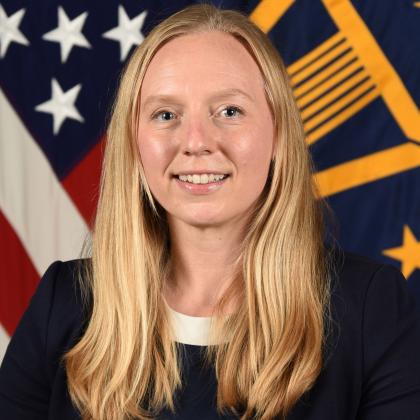Former Acting DoD CIO Moves to State Department
The U.S. State Department announced today that Kelly Fletcher will be its new chief information officer (CIO), overseeing $2.5 billion of information technology programs to support State’s global diplomatic efforts.
“Dr. Fletcher brings a wealth of experience in both technological and strategic resourcing domains,” stated Ned Price, State Department spokesperson, in a release. “Dr. Fletcher’s appointment as CIO aligns with Secretary of State Antony Blinken’s call for modernization of American diplomacy. Securing top talent to drive technological innovation helps ensure an interconnected, secure and informed department for 21st century diplomacy.”
Last year, until John Sherman took the helm as the Department of Defense’s (DoD's) CIO, Fletcher—a Senior Executive Service official who holds a doctorate degree in engineering from Georgia Institute of Technology—served as the acting DoD CIO.
She performed the DoD CIO duties, overseeing information technology, cybersecurity, communications, spectrum and position, navigation and timing capabilities until Sherman went through the confirmation process and took office December 17, 2021. After that, she continued as the DoD’s principal deputy CIO. Fletcher had been working in that office since 2020, including as the principal director for Resources & Analysis.
According to the DoD, Fletcher served as the acting Department of the Navy CIO and was their Business Modernization lead from December 2016 to September 2018. “As the CIO, she provided strategic leadership for all Department of the Navy information technology policy and budget decisions and led a departmentwide reorganization of information technology governance and oversight,” a DoD statement indicated.
In addition, Fletcher spent six years with the Office of the Secretary of Defense Cost Assessment and Program Evaluation, where she served as the special assistant to the deputy director and was an operations research analyst.
Previously, at the Department of Homeland Security, she was the deputy director for Program Analysis & Evaluation, the State Department noted.
Fletcher will be a key part of Secretary Blinken’s efforts to modernize the technology side of American diplomacy. Blinken’s plan, outlined last fall, focused on cyberspace and emerging technologies, in addition to focusing on the nontechnology side of building State’s future diplomacy capacities and expertise.

Dr. Fletcher’s appointment as CIO aligns with Secretary of State Antony Blinken’s call for modernization of American diplomacy. Securing top talent to drive technological innovation helps ensure an interconnected, secure and informed department for 21st century diplomacy.
In April, the State Department opened its new Bureau for Cyberspace and Digital Policy, and last month, the Senate approved the nomination of Nate Fick to be the State Department’s new Ambassador at Large for Cyberspace and Digital Policy. Fick and the new office will conduct cyber diplomacy around the globe and set international norms around cybersecurity. The department is also creating a new position called the special envoy for critical and emerging technology.
Both offices will benefit from Fletcher’s guidance as CIO.
“We have a major stake in shaping the digital revolution that’s happening around us and making sure that it serves our people, protects our interests, boosts our competitiveness, and upholds our values,” Secretary Blinken stated last October. “We want to prevent cyber attacks that put our people, our networks, companies, and critical infrastructure at risk. We want the internet to remain a transformative force for learning, for connection, for economic growth, not a tool of repression. We want to shape the standards that govern new technology, so they ensure quality, protect consumer health and safety, facilitate trade, respect people’s rights. We want to make sure the technology works for democracy, fighting back against disinformation, standing up for internet freedom, reducing the misuse of surveillance technology. And we want to promote cooperation, advancing this agenda tech by tech, issue by issue, with democratic partners by our side.”




Comments